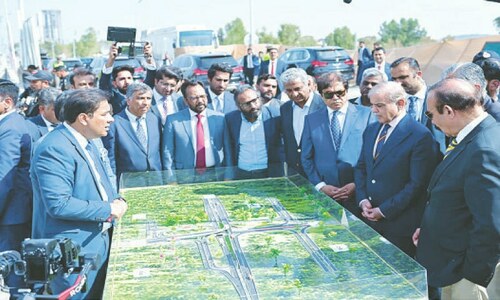CAN renewable energy truly help Pakistan resolve the current energy crisis? It is my view that renewable energy is an essential part of the country’s energy mix, even if it’s not the ultimate solution.
Biomass can play a significant role as part of a combination of indigenous energy resources that can help in the production of high value bio fuels using second and third generation cellulosic and non-cellulosic ethanol production technologies. Biomass has either been ignored or been utilised at very low levels.
The availability of biomass is widespread. It has traditionally provided a major portion of traditional fuels that are used in the developing world. Ironically, biomass can become a priority resource to substitute fossil fuels in the energy sector. Pakistan has abundant sources of agricultural lingo-cellulosic biomass residues such as wheat straw, rice straw, cotton sticks, bagasse, corn cobs, corn stover and various other crop residues. Most of these wastes are either burnt in the fields or used as secondary biomass for household fuels in rural communities.
An added benefit of biogas production is the co-generation of high quality organic fertiliser. The cost of chemical fertiliser has soared in recent years
The country has total agricultural biomass of around 80m tonnes, with stored energy sufficient to replace 25m barrels of oil equivalent energy (BOE), compared to 67 MMTOE of total annual energy consumed from modern fuels. This shows that biomass could theoretically provide a major portion of Pakistan’s energy needs.
It is estimated that 1m tonne of animal manure are produced daily. And this number ignores poultry and other livestock droppings. As per a livestock census conducted in 2006, there were approximately 57m bovines in Pakistan. On average, the daily dropping of a medium-sized bovine like a buffalo or a cow is estimated at around 15kg. This would yield 854m kilogrammes of dung per day. Assuming 50pc collection, the availability of fresh dung comes out to be 427m kg/day.
This could theoretically produce 745m standard cubic feet of biogas through biomethanation, according to estimates derived from a study by Veolia. It is estimated that the potential production of biogas from livestock residue is around 300bn cubic feet of biogas per annum. Even diverting half of this cow manure and other animal waste to production of biomethane and biochemicals can greatly alleviate Pakistan’s energy crisis, although the transport of this quantity of biomass poses significant logistical challenges.
The Alternative Energy Development Board (AEDB), with the help of international experts such as the United Stated National Renewable Energy Laboratories (NREL), GIT from Germany and Risoe from Denmark, identified various potentials of renewable energy. They believe that bagasse co-generation could produce at least 1,800MW.
One of the added benefits of biogas production is the co-generation of high quality organic fertiliser. Biomethanation will lead to the production of substantial biofertiliser, which is an essential requirement for sustaining the fertility of agricultural land. The cost of chemical fertiliser has soared in recent years, and though the government significantly subsidises it, the price is still prohibitive.
Pakistan is an agri economy where increasing volumes of urea and other chemical fertilisers are being used. In fact, in the last 10 years, the volume of fertiliser used per acre has doubled, but production has remained static and in many cases declined. This is due to loss of organic matter, over-nitrification, soil run off, and over-application of chemical fertiliser. Utilising agri waste to biogas recycles most of the nutrients in the form of fertiliser and is a major step in cost-reduction for farmers.
While we should encourage the conversion of biomass into biogas, biofuels and biofertilisers, the issue with growing energy crops is that they take away from precious water resources and have an impact on the prime issue of food security. The debate of food security versus energy crops is one that needs to be looked at very closely.
There is also the major issue of sustainability, as Pakistan is prone to huge fluctuations in rainfall, which reduces biomass availability and increases its price, which can affect the viability of biogas and power generation. Globally, there has also been a trend of biomass prices increasing as soon as large offtakers tie up suppliers.
Ultimately, producers of biomass have to be a part of any value-addition that takes place, otherwise biogas and power generation cannot be done on a long-term basis. This means that farmers have to play a critical role in the sustainability and viability of the biofuels and biochemical industry.
Pakistan has the potential to benefit greatly from its biomass resources. However, this potential can only be converted by unshackling business entrepreneurs from ancient legal regimes and corrupt government functionaries.
The writer is the Secretary General of the Energy Expert Group, a policy advisory group that developed Pakistan’s first Integrated Energy Plan in 2009.
abbas.bilgrami@juniper-advisors.com
Published in Dawn, Economic & Business, September 8th, 2014














































Dear visitor, the comments section is undergoing an overhaul and will return soon.